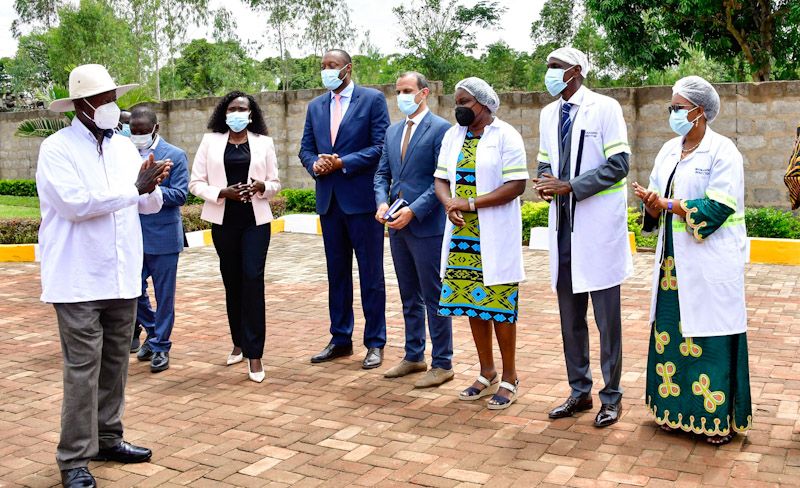

President Museveni received by proprietors of Kike Fruit Factory in Nakaseke
President Yoweri Museveni has said his 4-acre model of commercial agriculture for wealth creation and food security is a resounding success.
Museveni made the comments while officiating at the Launch of Kike-Tropical Fruit Factory in Nakaseeta Village in Kakooge Subcounty, Nakasongola District, Museveni called on Ugandans to move away from subsistence agriculture and dedicate an acre to Coffee plantation, an acre to fruit growing, the third acre to animal husbandry and the fourth to food production.
President Museveni told the audience that for years now, he has been advising Ugandans to get involved in commercial agriculture with calculation, saying that it’s one of the best ways of fighting poverty and creating wealth.
“When we came to power in 1986, many farmers had made a mistake of fragmenting family land through inheritance and that is why I said in 1989 to 1995, that you need the four-acre model. We told you that if you have got four acres of land now, in one acre put coffee, in the second acre put fruits like oranges, mangoes or pineapples. In the third acre put pasture for zero grazing cows for milk and in the fourth acre you put food crops like cassava…..In the backyard, you put poultry for eggs and for those who are not Muslims, look after pigs. Then if you are near the swamp, make fishponds,” Museveni added:
“Therefore, these seven activities are what can save a man of four acres or less. That is what we told you. Our message was partially heard, that is how people in Luwero started to grow fruits like pineapples because we talked so much about it at that time.”
To achieve this well calculated model of agriculture, Museveni advised Ugandans to desist from land fragmentation saying small pieces of land may not allow profitable agriculture and thus remain in absolute poverty.
President Museveni thanked Ms. Olivia Mugabe who persuaded her brother Francis Mugabe to set up Kike Tropical Fruits Limited, for her persistence that led to the formation of the factory.
“I found that daughter of mine in Austria. She told me she wants to come back to Uganda and add a brick to the development of our country. I suggested to her that she find a market in Austria so that they buy our products. She managed to get to the market and then came back here to get what she could sell to them,” he said.
Museveni added that when Olivia realized that the Austrian market needs standard processed fruits, she mobilized her brother Francis to set up the factory.
“I want to thank Olivia and Francis for having spectacles that see far. You know, you Ugandans want to import a lot. Francis was an importer but later realized that he can manufacture what Ugandans import.”-Museveni
Before the president addressed the audience that witnessed the launch of Kike Fruit Factory, the proprietor of the factory, Francis Mugabe thanked President Museveni for honoring their invitation, informing him that the fruits used in the factory are supplied by local farmers from across the country.
“We offer them ready markets for their fruits. Not only do we offer them ready market, but we also employ their children,” Mr. Mugabe asserted, adding that Kike Tropical Fruits Limited now exports its pineapple concentrate to the European Union (EU) market. Our products have been tested and they meet the required standards of the EU market and that is why we are exporting.”-Mugabe.
Mugabe told President Museveni that the factory already has a huge demand for Mango and pineapple pulp used in juice making both local and international markets, the factory is limited with affordable credit to grow its capacity.
Due to increased demand for the Factory’s products, Mugabe informed the President that he had to acquire a loan from the Uganda Development Bank (UDB) to upscale and expand the capacity.
“we were able to finance half of what we requested because we lacked collateral, but I think we shall harmonise that,” the investor said.
“We are meeting only 30 percent of the required volumes of mango pulp for our local customers, so we are missing out on the remaining 70 percent. we need you to support us and acquire machines that can contain that capacity so that we can take up the remaining 70 percent.” Mugabe revealed.
Among other challenges, Mugabe noted that there is need to review the Excise Duty law to relieve the producers of juice from the taxes levied on Mango and pineapple juices, if the industry is to grow.
Mugabe says whereas this excise duty is not levied on his products, the increase of the tax creates a burden on his off takers like Britain, Coca-Cola and Haris which make their juice products expensive as compared to other juices on the market.
He further explains failure to revise the Excise duty law on locally produced juice may result in more juice imports which would subsequently affect the local fruit farmers.
In response to the challenges faced by the factory as presented by Mugabe, President Museveni assured him of the government’s support.
“What you are talking about are small things, supporting Francis is very easy. We give money to people who have nothing to do, and they squander it. How about someone who is doing something good? The problem is not money, the problem is the people who can execute the work we want. You will get more money from Uganda Development Bank (UDB),” Museveni said.
“The other issue of tax will also be handled.”
Thanking the proprietor of Kike Tropical Fruits Limited, for joining the crusade of industrialization and for offering jobs to the Ugandan youth, Matia Kasaija, the Minister of Finance, Planning and Economic Development, also assured Mugabe of government support in order for him to develop and sustain his factory.
“I want to assure him that if you want more money, please come and see us. We shall see how we can help you so that you can expand. On the issue of unfavorable taxes, we are going to sort that out because we cannot afford to have an entrepreneur of this type stalled. It means we are not doing what we are supposed to do.”-Kasaija


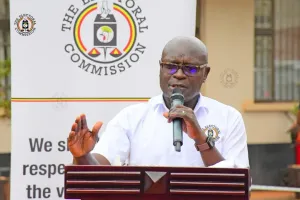
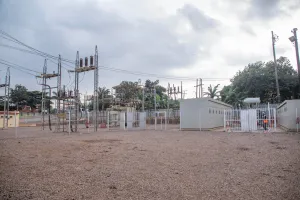


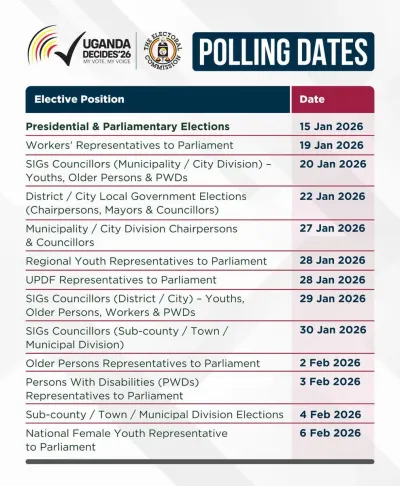





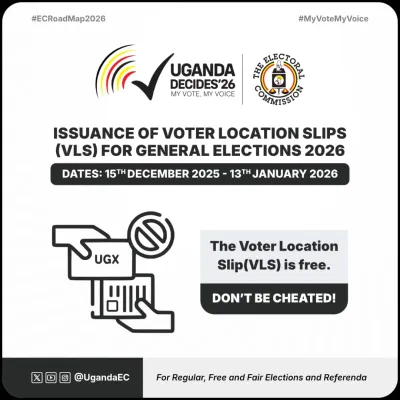

Solomon Lubambula
Leave a Comment
Your email address will not be published.